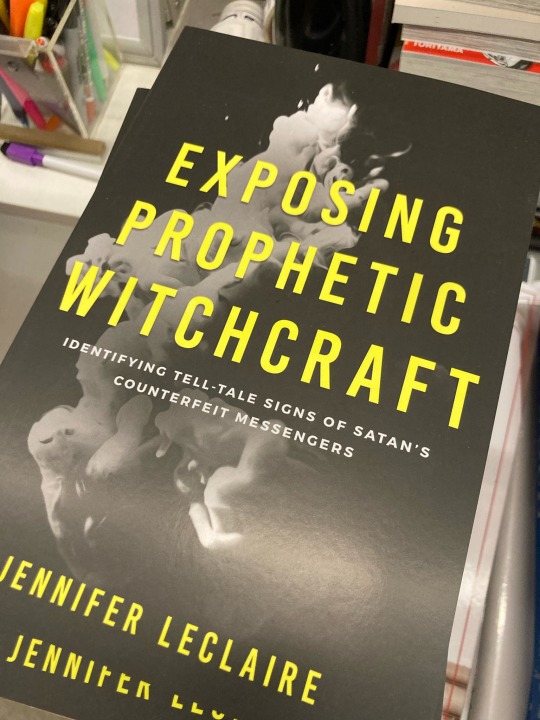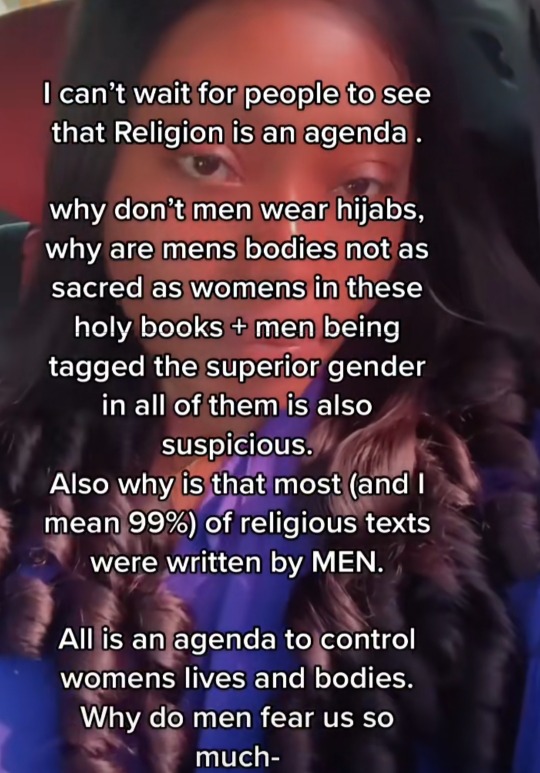#radical christianity
Text


#us politics#twitter#tweet#conservatives#republicans#conservatives be like#republicans be like#religions#organized religion#Jesus Christ#pronouns#gender pronouns#respect pronouns#republican homophobia#radical christianity#john 18:6#lavern spicer#us constitution#2022
182 notes
·
View notes
Text
In a keynote speech to a gathering of Christian nationalist lawmakers Tuesday night, House Speaker Mike Johnson compared himself to Moses, leading the GOP conference — and America — through the parted waters of the Red Sea.
Johnson addressed the National Association of Christian Lawmakers at the group’s award gala at the Museum of the Bible in Washington, D.C. Perhaps unaware that the event was being recorded for the NACL Facebook page, Johnson told the crowd: “I’ll tell you a secret, since media is not here.” (“Thank you for not allowing the media in,” Johnson added, alleging that journalists have been taking his comments “out of context” with “great joy for the last few weeks.”)
Johnson then revealed that — in the lead up to the “tumult” of Kevin McCarthy losing his gavel and the chaotic GOP process of selecting new Speaker — he had been speaking directly to God. “Look, I’m a Southern Baptist, I don’t wanna get too spooky on you,” he said, provoking some laughter from the attendees. “But, you know, the Lord speaks to your heart.”
The message he received from God, Johnson said, was to prepare for a “Red Sea moment” — both for the Republican conference “and in the country at large.” Johnson said found the directive confusing but he continued to seek the counsel of God.
“The Lord began to wake me up, through this three-week process, in the middle of night to speak to me,” Johnson insisted. “Now at the time,” he continued, “I assumed the Lord is going to choose a new Moses.” But because of his own lesser rank among the GOP’s leadership, Johnson said, he believed the heavenly message to be: “You’re gonna allow me to be Aaron to Moses,” citing the role of the Old Testament prophet’s brother and biblical sidekick.
But then Johnson watched as candidate after candidate failed to generate the necessary Republican support to win the Speakership. “Ultimately 13 people ran for the post. And the Lord kept telling me to, ‘Wait, wait, wait,’” Johnson recalled. “So I waited, I waited. And then at the end … the Lord said, ‘Now step forward.’” Johnson regaled the audience with his surprise to be tapped as the Moses figure: “Me?” Johnson said. “I’m supposed to be Aaron.” But that was not the message, Johnson insisted, recalling: “‘No,’ the Lord said, ‘Step forward.’”
Johnson’s speech to the National Association of Christian Lawmakers — a group that seeks to enact its anti-abortion and anti-LGBTQ “biblical worldview” into law — is just the latest evidence that the politician who is now second in line for the presidency views himself as on a divine mission. Rolling Stone previously reported on Johnson’s exhortations to save a “depraved” America from God’s wrath and vengeance.
Johnson told the NACL crowd that his “core conviction” that “God wants us to seek Him for the path through the roiling sea.” The Speaker then underscored his pessimism about the state of the nation, asserting that America is facing the “greatest collection of challenges since maybe World War II, maybe the Civil War.”
America, Johnson insisted, is “engaged in a battle between worldviews” and “a great struggle for the future of the Republic.” The specifics of that struggle remained unspoken. But the NACL mission, according to materials promoting the gala, includes: “abolishing abortion”; restoring “traditional marriage between one man and one woman”; and “exposing the ungodly effort to undermine our culture by Leftists,”. Johnson added that he believed far-right Christians will prevail: “We should not be daunted. In the face of these challenges. Our hope is in the Lord, our hope, and our trust is in God.”
At the gala, Johnson was awarded with NACL’s “American Patriot Award for Christian Honor and Courage.” It was bestowed to recognize what the group’s leader, former Arkansas state Rep. Jason Rappert, described as Johnson’s “statesmanship, bold Christian leadership, and faithful service to our Lord Jesus Christ.”
#us politics#news#republicans#conservatives#alt right#conservative christians#gop#rep. Mike Johnson#National Association of Christian Lawmakers#rolling stone magazine#moses#old testament#anti abortion#Republican homophobia#2023#radical Christianity
14 notes
·
View notes
Text
“The notion of God as Cosmic Moralist has suggested that God is primarily interested in order. The notion of God as Unchangeable Absolute has suggested God’s establishment of an unchangeable order for the world. And the notion of God as Controlling Power has suggested that the present order exists because God wills its existence. In that case, to be obedient to God is to preserve the status quo. Process theology denies the existence of this God.” - John Cobb; Process Theology: An Introductory Exposition; emphasis my own
#progressive christianity#christian#process theology#theology#john cobb#process#process philosophy#radical christianity#progressive christian#radical christian#christian socialism#christian communism
6 notes
·
View notes
Text
Current Thoughts

Based on my experience, in America (and other more progressive countries), it’s so easy to lose sight of what it means and entails to be a Christian. The Bible tells us to vilify ourselves, sell everything we own, help and love others in the same we would like to be helped and loved. When we have choices, we choose the comfortable route opposed to radical Christianity.
1 note
·
View note
Text
This goes in my bookstore’s Christian section, they’re really out here trying to restart the witch trials

1 note
·
View note
Text

Another based TikTok woman being 100% right about religion, love the tendency ✊
#radfem#radical feminism#radfem safe#radfems do interact#radblr#feminism#radfems do touch#women's rights#women's liberation#religion#anti religion#anti islam#anti muslim#anti hijab#islam opresses women#islam hates women#anti christianity#abrahamic religions#christianity#islam#muslim#hijab#hijabi#women's oppression#abolish religion#abolish islam#religious#holy book#quran#bible
4K notes
·
View notes
Text

#there’s nothing i could add to this#good job#bible#christian bible#female#radical feminists do interact#feminism#radical feminist safe#girls who smoke weed#smoke weed everyday#weeed#weed
469 notes
·
View notes
Text
religion will be like, it's because women talk to animals and eat fruit that childbirth is so painful, and the soil so hard to work! Not because we took away all of the midwives and created horrendous agriculture practices
#anti religion#blame shifting#victim blaming#radical feminism#anti christianity#anti patriarchy#pro midwife#pro no-dig gardening#anti agriculture
456 notes
·
View notes
Text
this sunday, it was dissapointing to see how easy it was for the boys to run around and get their energy out outside, but for the little toddler girls in impractical frilly puffy dresses and impractical shoes, it's an obstacle for their play.
the girls', clothes are made to be seen in as opposed to being made to be worn, unlike the boys which are still nice for easter but they dont have to trip over the edge of a skirt or dress, or have their shoes fall off or pinch their toes when running, they can move and play freely.
it's a problem too cuz when toddlers don't get that energy out, they get irritable and pitch fits, so then the boys look like easy kids, and the girls difficult. let the girls run around!
female subjugation starts from birth. these girls are praised for being beautiful in their dresses, while also learning they cannot play in them. this correlation will not be lost on them especially as they grow up. "If i want positive attention from the important people in my life (like my congregation), this is what i do." the whole "beauty is pain" narrative, while not incorrect, is often viewed as normal and a justified fact of life, like "beauty IS pain and thats just how it is! oh the things us women go through to look pretty haha!". stop teaching girls that their beauty is WORTH pain, because it's not! they should never sacrifice to look attractive.
if half the congression can dress both formal and practical, so can the other half. don't handcuff little girls to femininity at the cost of their happiness and energy and play.
#I wore a pair of jeans and my little brother's old polo shirt that no longer fits him-- essentially what every#man was wearing. it was nice for Easter and it wasn't uncomfortable and it was practical.#although not the root of my atheism#the subjugation of women in the church does not make me miss christianity. I'm resentful of this institution hurting girls and women#radfem#radical feminist safe#radblr#sex based oppression#not j a reblog tag#male socialization
252 notes
·
View notes
Text

how about the men who are apparently weak enough to "stumble" when seeing an underage girl's developing breasts are just not fit for Christian heaven and by constantly accomodating them, you are actually getting in the way of God's plan to send only the righteous to heaven? Because a guy who puts his own comfort over the safety of another person isn't that righteous after all and won't get into heaven either way.
(I don't really believe in Christianity btw, I am just trying to follow the argument of not cause men to "stumble" instead of teaching them how to be a righteous person. in my opinion, the latter would get them into heaven at a much higher rate than just making girls vulnerable to car accidents)
#ex fundamentalist#misogyny#feminism#christianity#religious trauma#religion#fundamentalism#fundamentalist christianity#women's rights#radfem#radfem safe#radical feminism#feminist#women's safety#women's liberation#women's lib#radblr#radical feminists do interact#radical feminists please touch
202 notes
·
View notes
Text

#pro life#entitlements#us politics#religions#organized religion#jesus christ#Republicans#conservatives#gop#evangelicalism#evangelical christianity#radical christianity#simping for capitalism#libertarians#deregulation#eye for an eye#anti immigration#memes#shitpost
90 notes
·
View notes
Text
In kindergarten classrooms across Texas, 5-year-olds coming to school for the first time could soon be greeted by picture books, colorful blocks and the words, “Thou shalt not covet thy neighbor’s wife.”
As those children grow up in the state’s public schools, they could get dedicated time in the day to read the Bible or pray. And if they are going through a hard time, they could turn to a chaplain — rather than a licensed school counselor — for help on campus.
Lawmakers are working to inject Christianity into the state’s public schools through a slate of bills under consideration in the Texas Legislature.
What critics see as an assault on the separation of church and state, supporters argue is a step forward for religious liberty after a major Supreme Court decision last year.
The religious bills are backed by powerful figures both inside and outside the Capitol building and are arriving as Republicans double-down on what is seen as a winning issue to energize their base: accusing public schools of indoctrinating students with a “woke” agenda.
But despite outcries of indoctrination, opponents of the bills warn that they place a premium on promoting a religious viewpoint to children.
“This is certainly moving towards a preferred faith in Texas, which is something that is deeply concerning,” said Joshua Houston, advocacy director for the interfaith group Texas Impact.
On Tuesday, the House gave final approval to a bill that would allow chaplains without state certification to work inside schools.
Rep. Cole Hefner, R-Mount Pleasant, said the plan is about giving school districts “every tool that we can in the toolbox” to combat mental health problems and other crises. He conceded that districts could eventually replace all counselors with chaplains, and rejected Democrats’ amendments to require parental consent and that schools provide a representative of any denomination if requested by a student, teacher or parent.
Rep. Gene Wu, a Houston Democrat, attempted to bar schools from using public funds to pay the chaplains.
“We should not use public monies to compensate religious services,” Wu said.
The amendment failed on a largely party-line vote, with Hefner saying it “just completely messes up the purpose of the bill.”
The tension on display Monday echoed earlier legislative hearings on the larger slate of religious bills.
Some believers argue that putting God into schools could make campuses safer from violence, as well as reflect foundational values. Opponents retort that kids who aren’t Christian could feel alienated in public classrooms.
Republican Rep. Brad Buckley, who chairs the public education committee, signed onto both a bill to require classrooms to hang posters of the Ten Commandments and one that would allow schools to hire chaplains.
When asked whether putting the Ten Commandments in classrooms would infringe on students who don’t practice Christianity, Buckley said the bill doesn’t call for instruction.
The legislation requires posters that are at least 20 inches high and 16 inches wide to be displayed in every classroom that declare “I AM the LORD thy God. Thou shalt have no other gods before me” and include the other commandments.
When asked how a teacher should respond if a student asks about their meaning, Buckley said it’s “a great time for a teacher to contact a child’s parent.”
“I don’t think this bill contemplates any instruction on that,” he said.
It also dovetails with Gov. Greg Abbott and Lt. Gov. Dan Patrick’s school-choice priority. The two Republicans are throwing their political weight behind a plan to funnel public dollars into families’ private school tuition — including at religious schools.
Abbott is using exclusively Christian campuses as rally spots. He’s visited at least a dozen schools across Texas, including Denton Calvary Academy in March.
WHY NOW?
Republican legislators behind the bills say they see an opening after the recent U.S. Supreme Court opinion that sided with a high school football coach who prayed on the field after games. Advocates say the opinion sets out a constitutional test that relies on history and tradition, and they are eager to test the proposed Texas laws before the court’s conservative majority.
“We think it is ripe, the opportunity is there,” former state Rep. Matt Krause told the Senate education committee last month. “We think there could be a restoration of faith in America.”
A few other states have made similar pushes, including a 2021 North Dakota law that allows the posting of Ten Commandments in classrooms alongside other historical texts.
Caroline Mala Corbin, a professor at the University of Miami School of Law, said the Texas bill requiring their display is the most problematic legally. The high court already found such a move unconstitutional, when in 1980 it held that a Kentucky law requiring the Ten Commandments be posted in public school classrooms was “plainly religious in nature.”
Corbin also pointed out that there is not a single version of the Ten Commandments, and that by choosing to display one, lawmakers are endorsing a specific religious denomination over others. Similarly, Corbin said in a country as diverse as the U.S., it is likely impossible to provide chaplains that cater to children of every faith, and therefore schools would be endorsing particular religions.
“The core principle of the Establishment Clause is that the government should not be favoring some religions over others and it does this to protect religious minorities,” said Corbin, whose research focuses on the First Amendment’s speech and religion clauses.
Shifts in local and statewide education positions could also be playing a role.
At the local level, school board elections are infused with highly partisan issues and big-money groups have attempted to “take over” some districts to make them more conservative.
The bill to bring chaplains on campus, as well as the one to allow for Bible reading and prayer time during school, contain an unusual provision: School boards would have to vote on whether to approve such a plan within six months of the legislation passing.
This could place political pressure on trustees to decide on a high-profile, touchy subject. The vote would likely come before the next set of school board races.
The State Board of Education also became more conservative after the last election cycle. Republicans flipped a seat and candidates further to the right replaced more moderate ones.
CHAPLAIN SUPPORT
Among the new State Board of Education members is Julie Pickren, a former trustee from the Houston area who was in Washington during the Jan. 6 insurrection.
Pickren also sits on the board of the National School Chaplain Association, according to its website. The group has been pushing lawmakers to pass what they've labeled the "Chaplain's Funding Bill." She did not return a request for comment.
"We are very close to putting God and prayer in public schools through chaplains," the group wrote to its supporters in an email blast earlier this month about the Texas bill, along with a request for donations.
The organization was central in the House debate Monday. Rep. James Talarico, D-Austin, referenced the group as he attempted to make amendments to the bill to include additional guardrails, including an unsuccessful one to require parental consent before a child visited with the chaplain.
The association's website gives insight into the goals of the movement.
“The scale of transformation and spiritual renewal resulting from the school chaplain program might be best described as revival,” the website reads. “Millions of young people and adults in their lives are being won to the Gospel of Jesus Christ and discipled in the name of Jesus. Discipleship involves training to win and disciple others.”
The legislation would allow a public school to employ a chaplain to fulfill a broad range of roles on campus and would not require the person to earn state certification.
Texas faces a shortage of qualified mental health professionals to work in schools. The American School Counselor Association recommends a ratio of 250 students to every one counselor. In Texas, it was 392-to-1, according to 2021 data.
Rep. Diego Bernal, D-San Antonio, asked whether it’s possible under the legislation that campuses could replace all of their counselors and social workers with chaplains.
“I trust our schools to make the right decisions in those areas. I don’t think they would do that,” Hefner said.
Houston, from the Texas interfaith group, said: “The question that lawmakers ought to ask themselves is just the basic golden rule, If it was a Muslim chaplain and a Christian child, what would you want the standards for the program to be?”
#us politics#news#texas#the dallas morning news#2023#republicans#conservatives#gop#gop policy#gop platform#radical christianity#conservative christianity#separation of church and state#religious indoctrination#Texas Legislature#chaplains#ten commandments#Joshua Houston#Texas Impact#Cole Hefner#Gene Wu#Brad Buckley#Gov. Greg Abbott#Dan Patrick#Establishment Clause#first amendment#1st amendment#Texas Board of Education#National School Chaplain Association#Chaplain's Funding Bill
49 notes
·
View notes
Text

#he speaks truth#also the sentiment i feel like i needed this evening#love thy enemies#love thy neighbor#a radical mission indeed#christianity
644 notes
·
View notes
Text
another example of how being popular in feminist online circles does not make someone a feminist by default. once again not much the fault of the community that called her out on her lesbophobia months ago for "driving her away" from feminism, but another symptom of a bigotry rabbit hole she was already slowly falling into
#she's researching CHRISTIAN feminism 🤣🤣#i'm sorry because isn't she 17 or something?#this is just to say that her irl environment is probably influencing her biases#because how do you even become pro life after claiming you're a feminist. not even a radical feminist. just a feminist#even the most libfemmy of all recognize the fact that a woman's life is more important than a potential baby's. like
248 notes
·
View notes
Text

#abortion access#abortion#reproductive rights#roe v wade#reproductive health#bodily autonomy#reproductive justice#catholic church#catholicism#catholic#christianity#lent#prayer life#orthodox#liberal feminism#radical feminism#intersectional feminism#feminism#patriarchy#misandry#intersectionality#womens rights
625 notes
·
View notes
Text
Very interesting (concerning) that while there’s a general consensus of “of course there’s queer Muslims and Jews and Christians we love them!” But that love is conditional. You can be religious but not too religious. You can be spiritual as long as it’s not actually that important to you. You can be observant of your religion’s dogma and traditions as long as you keep it away from everybody else.
But I don’t want to cut myself into smaller pieces. I don’t want to take a part of my life and culture and being and hide it away behind closed doors. It’s just…hypocritical and disappointing when people, who clamor about their love for the contradictory and self-authentic, hate when they’re confronted with it.
#tower of babble#catholic#lgbt#side b#sorry I saw a very good post pointing out the way queer Jews are often cited with the caveat that they’re not observant Jews#and how there are queer observant Jews but I didn’t want to derail so I made my own post#because fuckin hell how often do you see white queers telling queer Muslim women to stop wearing their hibjabi (unless it’s for ~cultural~#purposes). it’s disgusting and demeaning to assume queer people don’t have deeply meaningful spiritual lives.#side b Christians 🤝 observant queer Jews 🤝 devout queer Muslims#me. happily trans and gay: I’m so happy and blessed to have this body and life -#homo/transphobes: you’re going to hell you’re evil you’re stupid you’re faking it#me: huh. oh. um. well I’m still blessed because I know you are not speaking with Christ in your heart-#a surprising number of self proclaimed radicals: uhhhh please don’t acknowledge that you’re Christian it makes us. uncomfortable.#me: …being uncomfortable and confused about others is the pride of Pride? the queer community thrives on contradiction and self definition?#anyways. prof put my pronouns down as he/she/they on the syllabus and I am popping the biggest gender affirming bottles tonight#(praying a chaplet and eating rice like the grad student peasant I am)
374 notes
·
View notes